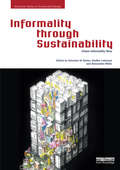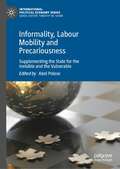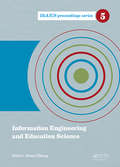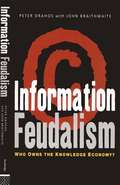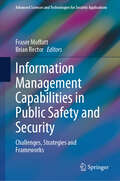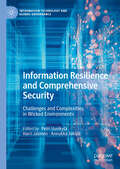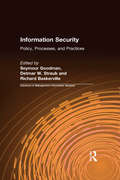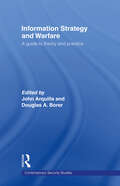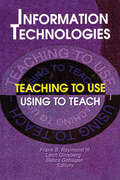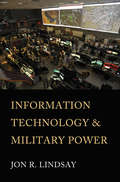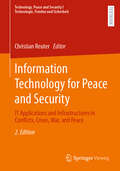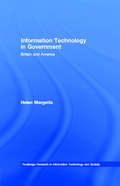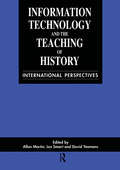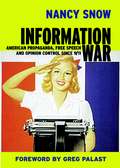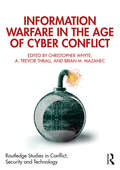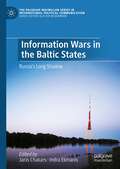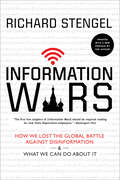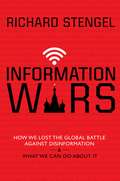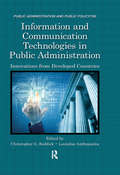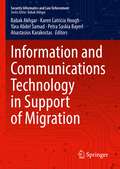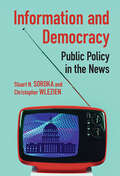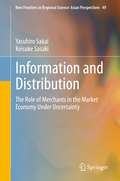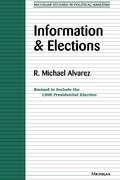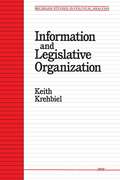- Table View
- List View
Informality through Sustainability: Urban Informality Now (Earthscan Series On Sustainable Design Ser.)
by Steffen Lehmann Alessandro Melis Antonino Di RaimoInformality through Sustainability explores the phenomenon of informality within urban settlements and aims to unravel the subtle links between informal settlements and sustainability. Penetrating its global profile and considering urban informality through an understanding of local implications, the authors collectively reveal specific correlations between sites and their local inhabitants. The book opposes simplistic calls to legalise informal settlements or to view them as ‘problems’ to be solved. It comes at a time when common notions of ‘informality’ are being increasingly challenged. In 25 chapters, the book presents contributions from well-known scholars and practitioners whose theoretical or practical work addresses informality and sustainability at various levels, from city planning and urban design to public space and architectural education. Whilst previous studies on informal settlements have mainly focused on cases in developing countries, approaching the topic through social, cultural and material dimensions, the book explores the concept across a range of contexts, including former Communist countries and those in the so-called Global North. Contributions also explore understandings of informality at various scalar levels – region, precinct, neighbourhood and individual building. Thus, this work helps reposition informality as a relational concept at various scales of urbanisation. This book will be of great benefit to planners, architects, researchers and policymakers interested in the interplay between informality and sustainability.
Informality, Labour Mobility and Precariousness: Supplementing the State for the Invisible and the Vulnerable (International Political Economy Series)
by Abel PoleseFrom the erosion of state legitimacy in Lebanon to the use of smartphones in Kyrgyzstan, from a Polish suburb to the music scene in Azerbaijan, this volume attempts to explain why, in a variety of world regions, a substantial number of people tend to ignore or act against state rules. We propose to look at informality beyond simplistic associations of the phenomenon with a single category such as "informal labour" or "corruption". By doing this, we propose to look for a correlation between the emergence, and persistence, of some informal practices and the quality of governance in a given area. We also suggest that a better understanding of the variety of informal practices present in a region can help conceptualising more adequate interventions and eventually improve the socio-economic conditions of its inhabitants.
Information Engineering and Education Science: Proceedings of the International Conference on Information Engineering and Education Science (ICIEES 2014), Tianjin, China, 12-13 June, 2014 (IRAICS Proceedings)
by Dawei ZhengThis proceedings volume contains selected papers presented at the 2014 International Conference on Information Engineering and Education Science (ICIEES 2014), held June 12-13 in Hong Kong, China. The objective of ICIEES 2014 was to provide a platform for researchers, engineers, academics as well as industry professionals from all over the world to
Information Feudalism: Who Owns the Knowledge Economy
by Peter Drahos John BraithwaiteNew intellectual property regimes are entrenching new inequalities. Access to information is fundamental to the exercise of human rights and marketplace competition, but patents are being used to lock up vital educational, software, genetic and other information, creating a global property order dominated by a multinational elite. How did intellectual property rules become part of the World Trade Organization's free trade agreements? How have these rules changed the knowledge game for international business? What are the consequences for the ownership of biotechnology and digital technology, and for all those who have to pay for what was once shared information? Based on extensive interviews with key players, this book tells the story of these profound transformations in information ownership. The authors argue that in the globalized information society, the rich have found new ways to rob the poor, and shows how intellectual property rights can be more democratically defined.
Information Management Capabilities in Public Safety and Security: Challenges, Strategies and Frameworks (Advanced Sciences and Technologies for Security Applications)
by Fraser Moffatt Brian RectorThis book provides thoughtful and extensively researched perspectives, to improve understanding of risks and rewards, and to outline strategies for developing and implementing mature information management capabilities focused on core public safety and security outcomes. Decision makers in Canadian public safety and security organizationslaw enforcement, fire and paramedic services, emergency management and national security, from local to national scopes and scales—are faced with an onslaught of rapidly changing technologies with uncertain application in an increasingly complex safety and security. How do these technologies fit into a strategic information management capability for public safety and security organizations? How do these technologies impact other areas of the organization? How can we harness these technologies to improve safety and security outcomes for Canadians? How would information governance strategy, governance and resourcing need to be structured and how would this function in the current operating environment and how would ethics, standards, privacy and information sharing and protection mechanisms need to be addressed in the face of compliance with legislation, regulation or policy? This volume makes the case for adopting strategic IM mindsets and practices intended to address a range of persistent IM challenges in public safety and security such as: building mature analytics and information sharing capabilities; building ethics, privacy, security and standards into IM governance aligned with public safety and security outcomes. The book is intended for senior decision makers in organizations that have responsibilities to delivery on core public safety and security outcomes and rely on information management to do so. These decision-makers face rapidly changing technologies in an increasingly complex business environment, face pressures for talent management and face risk-laden practices that impede or constrain the optimal use of information to achieve these outcomes for their organizations.
Information Politics, Protests, and Human Rights in the Digital Age
by Mahmood MonshipouriWe live in a highly complex and evolving world that requires a fuller and deeper understanding of how modern technological tools, ideas, practices, and institutions interact, and how different societies adjust themselves to emerging realities of the digital age. This book conveys such issues with a fresh perspective and in a systematic and coherent way. While many studies have explained in depth the change in the aftermath of the unrests and uprisings throughout the world, they rarely mentioned the need for constructing new human rights norms and standards. This edited collection provides a balanced conceptual framework to demonstrate not only the power of autonomous communication networks but also their limits and the increasing setbacks they encounter in different contexts.
Information Resilience and Comprehensive Security: Challenges and Complexities in Wicked Environments (Information Technology and Global Governance)
by Petri Uusikylä Harri Jalonen Annukka JokipiiChanges in the global environment, the complexity of decision-making, and the new role of social media have challenged the operating models and practices of traditional crisis preparedness and security of supply. In a knowledge society context, securing the continuous flow of information and communication on different platforms is a huge challenge, and the role of information resilience is more crucial than ever. Bringing together leading specialists from many fields on information resilience, this book examines how to ensure the undisturbed flow of information, the functionality of information and communications networks, and reliable and secure information content in all circumstances, both from an individual and societal viewpoint. The book address issues around information resilience from the standpoint of management, national security, misinformation, social media, and commercial actors. It will appeal to scholars and students of public policy, disaster management, security studies and governance, as well as practitioners.
Information Security: Policy, Processes, and Practices (Advances In Management Information Systems Ser. #42)
by Richard Baskerville Seymour Goodman Detmar W. StraubInformation security is everyone's concern. The way we live is underwritten by information system infrastructures, most notably the Internet. The functioning of our business organizations, the management of our supply chains, and the operation of our governments depend on the secure flow of information. In an organizational environment information security is a never-ending process of protecting information and the systems that produce it.This volume in the "Advances in Management Information Systems" series covers the managerial landscape of information security. It deals with how organizations and nations organize their information security policies and efforts. The book covers how to strategize and implement security with a special focus on emerging technologies. It highlights the wealth of security technologies, and also indicates that the problem is not a lack of technology but rather its intelligent application.
Information Strategy and Warfare: A Guide to Theory and Practice
by John Arquilla Douglas A. BorerThis volume develops information strategy as a construct equal in importance to military strategy as an influential tool of statecraft.John Arquilla and Douglas A. Borer explore three principal themes:the rise of theinformation domain and information strategy as an equal partner alongside traditional military strategythe need to consider the org
Information Technologies: Teaching to Use—Using to Teach
by Leon Ginsberg Frank B Raymond Iii Debra GohaganThis insightful volume explores examples of the use of technology to teach social work knowledge, values, and skills across the curriculum. The chapters cover a wide range of perspectives, including international views of the role of information technology in Great Britain and Malaysia, training approaches for faculty development, and computer-based software that has the potential to transform the manner in which curriculum objectives are met. Prepare for technology-based instruction in social work education for the 21st century!Information Technologies: Teaching to Use--Using to Teach Information Technologies: Teaching to Use--Using to Teach, addresses your need to fully prepare today?s social work graduates to work and live in this rapidly changing, technology-enhanced environment. Based on the 1997 Information Technologies Conference: Using to Teach--Teaching to Use, held in Charleston, South Carolina, this book covers the multitude of topics that were presented on technology-based instruction as we head into the 21st century. Articles in Information Technologies range from the use of the Internet and computer applications to research projects that address the effectiveness of technology-based teaching and learning activities. It also dicusses international views on the role of information technology in Britian and Malaysia. Information Technologies gives particular attention to distance education, and it is the most thorough treatment to date of the use and teaching of technology in social work education. Specific areas you?ll gain valuable information from include:establishing a faculty development labstarting intensive faculty training sessionscomputer-based software that has the potential to transform the manner in which curriculum objectives are metinternational perspectives on information technologythe use of Geographic Information Systems technology in social work practice as a tool for improved visualization of social and economic inequalitiesmodels for teaching social work curriculum with technologyWith Information Technologies, you will gain a competetive edge in preparing your faculty and students with the latest world-wide information on studies pretaining to technology use in a social work setting. A conglomeration of diverse and well-researched articles on the use of technology to enhance social work education await you in this special volume.
Information Technology and Military Power (Cornell Studies in Security Affairs)
by Jon R. LindsayMilitaries with state-of-the-art information technology sometimes bog down in confusing conflicts. To understand why, it is important to understand the micro-foundations of military power in the information age, and this is exactly what Jon R. Lindsay's Information Technology and Military Power gives us. As Lindsay shows, digital systems now mediate almost every effort to gather, store, display, analyze, and communicate information in military organizations. He highlights how personnel now struggle with their own information systems as much as with the enemy.Throughout this foray into networked technology in military operations, we see how information practice—the ways in which practitioners use technology in actual operations—shapes the effectiveness of military performance. The quality of information practice depends on the interaction between strategic problems and organizational solutions. Information Technology and Military Power explores information practice through a series of detailed historical cases and ethnographic studies of military organizations at war. Lindsay explains why the US military, despite all its technological advantages, has struggled for so long in unconventional conflicts against weaker adversaries. This same perspective suggests that the US retains important advantages against advanced competitors like China that are less prepared to cope with the complexity of information systems in wartime. Lindsay argues convincingly that a better understanding of how personnel actually use technology can inform the design of command and control, improve the net assessment of military power, and promote reforms to improve military performance. Warfighting problems and technical solutions keep on changing, but information practice is always stuck in between.
Information Technology for Peace and Security: IT Applications and Infrastructures in Conflicts, Crises, War, and Peace (Technology, Peace and Security I Technologie, Frieden und Sicherheit)
by Christian ReuterTechnological and scientific progress, especially the rapid development in information technology (IT) and artificial intelligence (AI), plays a crucial role regarding questions of peace and security. This textbook, extended and updated in its second edition, addresses the significance, potential of IT, as well as the challenges it poses, with regard to peace and security. It introduces the reader to the concepts of peace, conflict, and security research, especially focusing on natural, technical and computer science perspectives. In the following sections, it sheds light on cyber conflicts, war and peace, cyber arms control, cyber attribution, infrastructures, artificial intelligence, as well ICT in peace and conflict.
Information Technology in Government: Britain and America (Routledge Research in Information Technology and Society #Vol. 2)
by Helen MargettsThis book situates information technology at the centre of public policy and management. IT is now a vital part of any government organisation, opening new policy windows and enabling a vast range of tasks to be carried out faster and more efficiently. But it has also introduced new problems and challenges. Four in-depth case studies demonstrate how information systems have become inextricably linked with the core tasks of governmental organisations. The key government departments examined are:* the Inland Revenue Service and Social Security Administration in the US* the Inland Revenue and Benefits Agency in the UK
Information Technology in the Teaching of History: International Perspectives
by David Yeomans Lez Smart Allan MartinInformation technology offers powerful tools to facilitate and to assist learning across the whole curriculum; the computer is certainly the most significant development in educational technology in the twentieth century. History may be thought of as a staid and perhaps tradition-bound subject, more resistant to change than some areas. Yet in history too, information technology is making an impact. This volume shows how information technology is currently contributing to, and bringing about changes in the way history is taught and learned. The international selection of the contributions shows that these phenomena are not restricted to just one country. The impact of information technology on history curricula is explored in depth in one section of the book, whilst other sections focus on classroom activities and issues, on the development of software for history, and on the relevance of current information technology developments. But the question which lies at the heart of it all remains that of how information technology can enhance the teacher's ability to offer situations in which learners can form and develop a real understanding of the nature of historical processes, and the ways in which they can be studied.
Information War: American Propaganda, Free Speech and Opinion Control Since 9-11 (Open Media Series)
by Greg Palast Nancy SnowIn Information War, former United States Information Agency employee Nancy Snow describes how U.S. propaganda efforts and covert operations are expanding more rapidly today than at any other time in U.S. history, as the Bush administration attempts to increase U.S. dominance by curbing dissent and controlling opinion. Snow lays out the propaganda techniques that the government uses to control dissent in the twenty-first century, spotlights the key players and their spinmeistering abilities in the information war, and describes memorable "leaks" in the Administration's efforts to conduct stealth propaganda programs and control information at home. Ultimately she shows that dissent and true democracy are the early casualties of these policies.
Information Warfare in the Age of Cyber Conflict (Routledge Studies in Conflict, Security and Technology)
by Christopher Whyte Brian M. Mazanec Trevor ThrallThis book examines the shape, sources and dangers of information warfare (IW) as it pertains to military, diplomatic and civilian stakeholders. Cyber warfare and information warfare are different beasts. Both concern information, but where the former does so exclusively in its digitized and operationalized form, the latter does so in a much broader sense: with IW, information itself is the weapon. The present work aims to help scholars, analysts and policymakers understand IW within the context of cyber conflict. Specifically, the chapters in the volume address the shape of influence campaigns waged across digital infrastructure and in the psychology of democratic populations in recent years by belligerent state actors, from the Russian Federation to the Islamic Republic of Iran. In marshalling evidence on the shape and evolution of IW as a broad-scoped phenomenon aimed at societies writ large, the authors in this book present timely empirical investigations into the global landscape of influence operations, legal and strategic analyses of their role in international politics, and insightful examinations of the potential for democratic process to overcome pervasive foreign manipulation. This book will be of much interest to students of cybersecurity, national security, strategic studies, defence studies and International Relations in general.
Information Wars in the Baltic States: Russia’s Long Shadow (The Palgrave Macmillan Series in International Political Communication)
by Janis Chakars Indra EkmanisThis edited volume, featuring accomplished scholars, is about the information wars in the Baltic states, a battle that pits Russia against the West with Estonia, Latvia and Lithuania as sites of contention for great power politics. Chapters address responses from titular populations, local Russian speakers, national governments, activists, journalists, and NATO, as well as the impact of Russian foreign policy on media.
Information Wars: How We Lost the Global Battle Against Disinformation & What We Can Do About It
by Richard StengelA “well-told” insider account of the State Department’s twenty-first-century struggle to defend America against malicious propaganda and disinformation (The Washington Post).Disinformation is nothing new. When Satan told Eve nothing would happen if she bit the apple, that was disinformation. But today, social media has made disinformation even more pervasive and pernicious. In a disturbing turn of events, authoritarian governments are increasingly using it to create their own false narratives, and democracies are proving not to be very good at fighting it.During the final three years of the Obama administration, Richard Stengel, former editor of Time, was an Under Secretary of State on the front lines of this new global information war—tasked with unpacking, disproving, and combating both ISIS’s messaging and Russian disinformation. Then, during the 2016 election, Stengel watched as Donald Trump used disinformation himself. In fact, Stengel quickly came to see how all three had used the same playbook: ISIS sought to make Islam great again; Putin tried to make Russia great again; and we know the rest.In Information Wars, Stengel moves through Russia and Ukraine, Saudi Arabia and Iraq, and introduces characters from Putin to Hillary Clinton, John Kerry, and Mohamed bin Salman, to show how disinformation is impacting our global society. He illustrates how ISIS terrorized the world using social media, and how the Russians launched a tsunami of disinformation around the annexation of Crimea—a scheme that would became a model for future endeavors. An urgent book for our times, now with a new preface from the author, Information Wars challenges us to combat this ever-growing threat to democracy.“[A] refreshingly frank account . . . revealing.” —Kirkus Reviews“This sobering book is indeed needed to help individuals better understand how information can be massaged to produce any sort of message desired.” —Library Journal
Information Wars: How We Lost the Global Battle Against Disinformation and What We Can Do About It
by Richard StengelFrom former Time editor and Under Secretary of State Richard Stengel, this is the first and only insider account of how the U.S. tried--and failed--to combat the global rise of disinformation that eventually spilled into the 2016 election. In February of 2013, Richard Stengel, the former editor of Time, joined the Obama administration as Under Secretary of State for Public Diplomacy and Public Affairs. Within days, two shocking events made worldwide headlines: ISIS executed American journalist James Foley in a graphic video seen by millions, and Vladimir Putin's "little green men"--Russian special forces--invaded Crimea, accompanied by a blizzard of Russian denials and false flags. What these events had in common besides their violent lawlessness is that they were the opening salvos in a new era of global information warfare, in which countries and non-state actors use social media and disinformation to create their own narratives and undermine anyone who opposes them. Stengel was thrust onto the front lines of this battle as he was tasked with responding to the relentless weaponizing of information by ISIS, Russia, China, and others. He saw the scale of what he was up against and found himself hopelessly outgunned. Then, in 2016, the wars Stengel was fighting abroad came home during the presidential election, as "fake news" became a rallying cry and the Russians used the techniques they learned in Ukraine to influence the election here. Rarely has an accomplished journalist been not only a close observer but also a principal participant in American foreign policy as events unfold, issues are debated, and decisions are made. Stengel takes you behind the scenes in the ritualized world of diplomacy, from the daily 8:30 morning huddle with a restless John Kerry to a midnight sit-down in Saudi Arabia with the prince of darkness, Mohammed bin Salman. The result is a compulsively readable account of how this new kind of warfare works and how difficult it is to fight. RICHARD STENGEL was the Under Secretary of State for Public Diplomacy and Public Affairs from 2013 to 2016. Before working at the State Department, he was the editor of Time for seven years, from 2006 to 2013. From 1992 to 1994, he collaborated with Nelson Mandela on the South African leader's autobiography Long Walk to Freedom. Stengel later wrote Mandela's Way, a New York Times bestseller, on his experience working with Mandela. He is the author of several other books, including January Sun, a book about life in a small South African town, as well as You're Too Kind: A Brief History of Flattery. He is an NBC/MSNBC analyst and lives in New York.
Information and Communication Technologies in Public Administration: Innovations from Developed Countries (Public Administration and Public Policy)
by Christopher G. Reddick Leonidas AnthopoulosAn examination of how information technology (IT) can be used in public administration, Information and Communication Technologies in Public Administration: Innovations from Developed Countries examines global perspectives on public administration and IT innovations. This book illustrates the theoretical context of current policies, issues, and imp
Information and Communications Technology in Support of Migration (Security Informatics and Law Enforcement)
by Babak Akhgar Petra Saskia Bayerl Karen Latricia Hough Yara Abdel Samad Anastasios KarakostasThe book provides a holistic review, presenting a multi-stakeholder, multi-disciplinary, international, and evidence-based approach to Information and Communications Technology (ICT) in migration. The book brings together different views and multifaceted responses to ICT-based migration management, examining their overlap, conflict, and synergies. The book is a major addition to the field, tackling important debates concerning humanitarianism and securitization in the reception of migrants, as well as exploring the role of digital technology in aiding migrant integration. The authors explore contentious areas such as the use of new technologies deployed on borders for migration management and border security under the umbrella of smart border solutions including drones, AI algorithms, and face recognition, which are widely criticized for ignoring the fundamental human rights of migrants. The research presented will depart from the euphoric appraisals that technology has made things easier for migrants and those who assist them, to critically examine the bane and boon, benefits and afflictions, highlighting the barriers, as well as the solutions, including several under-researched aspects of digital surveillance and the digital divide.This edited volume has been developed by the MIICT project, funded under the EU Horizon 2020 Action and Innovation programme, under grant agreement No 822380. Provides a positive approach to the integration of migrants, asylum seekers, and refugees using Information and Communications Technology (ICT) solutions Offers a strategic approach to providing digital services for migrants at an EU, national and local level Bridges the gap between academia and front-line practitioners’ work by providing theoretical, policy, ethical, and methodological recommendations
Information and Democracy: Public Policy in the News (Communication, Society and Politics)
by Stuart N. Soroka Christopher WlezienAround the world, there are increasing concerns about the accuracy of media coverage. It is vital in representative democracies that citizens have access to reliable information about what is happening in government policy, so that they can form meaningful preferences and hold politicians accountable. Yet much research and conventional wisdom questions whether the necessary information is available, consumed, and understood. This study is the first large-scale empirical investigation into the frequency and reliability of media coverage in five policy domains, and it provides tools that can be exported to other areas, in the US and elsewhere. Examining decades of government spending, media coverage, and public opinion in the US, this book assesses the accuracy of media coverage, and measures its direct impact on citizens' preferences for policy. This innovative study has far-reaching implications for those studying and teaching politics as well as for reporters and citizens.
Information and Distribution: The Role of Merchants in the Market Economy Under Uncertainty (New Frontiers in Regional Science: Asian Perspectives #49)
by Yasuhiro Sakai Keisuke SasakiThe purpose of this book is to discuss the relationship between information and distribution, with special reference to the role of the merchant in a market economy under conditions of risk and uncertainty. By working with simple models of the market economy and conducting a sequence of comparative analyses, the authors shed new light on an important yet rather neglected area in economics. In a historical perspective, the merchants of Ohmi, the former name of Shiga Prefecture in western Japan, are known to have put great faith in the principles of Sampo Yoshi or the all-around advantages of trading. It is hoped that the results presented in this book will provide some solid ground for such an old principle that can be seen in a new light. Applications to regional and many related problems are also discussed here. A distribution system is broadly defined as the systematic mechanisms and structures that regulate business operations, and its function is to maximize corporate value. Some of the following functions have previously been identified as distinguishing features of the Japanese distribution system compared with distribution systems in Europe and the United States: not only transactions, transportation, and storage, but also information, risk-bearing functions, and other characteristics. This book provides an overview of the distribution system in Japan, including changes that its practice have undergone and its current state; identifies current problems; and considers how these problems should be addressed.
Information and Elections
by R. Michael AlvarezR. Michael Alvarez examines how voters make their decisions in presidential elections. He begins with the assumption that voters have neither the incentive nor the inclination to be well-informed about politics and presidential candidates. Candidates themselves have incentives to provide ambiguous information about themselves, their records and their issue positions. Yet the author shows that a tremendous amount of information is made available about presidential candidates. And he uncovers clear and striking evidence that people are not likely to vote for candidates about whom they know very little. Alvarez explores how voters learn about candidates through the course of a campaign. He provides a detailed analysis of the media coverage of presidential campaigns and shows that there is a tremendous amount of media coverage of these campaigns, that much of this coverage is about issues and is informative, and that voters learn from this coverage. The paperback edition of this work has been updated to include information on the 1996 Presidential election. Information and Electionsis a book that will be read by all who are interested in campaigns and electoral behavior in presidential and other elections. "Thoughtfully conceptualized, painstakingly analyzed, with empirically significant conclusions on presidential election voting behavior, this book is recommended for both upper-division undergraduate and graduate collections. " --Choice R. Michael Alvarez is Associate Professor of Political Science, California Institute of Technology.
Information and Legislative Organization
by Keith KrehbielPresents an alternative informational theory of legislative politics to challenge the conventional view
